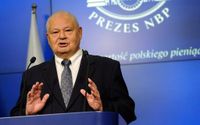On May 7, 2025, the Monetary Policy Council (RPP) is expected to announce a significant change in interest rates, marking the first reduction in over a year and a half. With economists widely predicting a cut of 50 basis points, the reference rate could drop from 5.75% to 5.25%. This anticipated decision follows a two-day meeting that began on May 6, where discussions centered around the current economic landscape and the necessity for easing monetary policy.
Since October 2023, interest rates have remained unchanged, but recent economic data suggests a shift may be on the horizon. NBP President Adam Glapiński has hinted at the possibility of further rate cuts, potentially lowering the reference rate to as low as 3.50% by 2026. "We expect a cut of 50 basis points on Wednesday," said Adam Antoniak, a senior economist at ING Bank Śląski. He believes this will mark the beginning of a series of reductions.
Glapiński's remarks during a press conference in April indicated a notable pivot in the central bank's stance. He stated, "I come as a dove leading other doves," signaling a shift towards a more accommodative monetary policy. The market reacted swiftly, with expectations for a cut solidifying as data emerged showing a slowdown in wage growth and inflation. Wage growth, which had been in double digits, fell to 7.7% year-on-year in March, while inflation rates have also decreased, leading to a more favorable economic outlook.
Members of the RPP have echoed Glapiński's sentiments, with Przemysław Litwiniuk asserting that he would propose a 50 basis point cut if such a motion is not raised by others. "If nothing changes by May 7, I will submit it myself," he stated, reinforcing the likelihood of a consensus among council members for a reduction.
Further supporting the anticipated cut is the economic context, which includes weaker-than-expected growth in the industrial sector and a decline in consumer spending. Reports indicate that industrial production increased by only 2.5% year-on-year, falling short of forecasts that predicted a rise of 3.6%. This slowdown has raised concerns about the overall health of the economy, prompting calls for a more proactive monetary policy approach.
The Ministry of Finance has also weighed in, indicating that there is no need for extending energy price shields, which have been in place to stabilize costs for consumers. President Andrzej Duda recently signed legislation delaying new electricity tariffs for households until October 1, 2025, allowing for continued price stability. Households will benefit from frozen electricity prices at 500 PLN per MWh until the end of September 2025.
As the RPP prepares for its decision, economists remain divided on the long-term trajectory of interest rates. While many predict additional cuts in the coming months, some analysts caution against rapid reductions. Ludwik Kotecki, another RPP member, expressed a preference for a cautious approach, suggesting that while a cut of 50 basis points is warranted, further adjustments should be contingent on incoming data.
Looking ahead, Kamil Łuczkowski from Bank Pekao anticipates a pause in rate cuts after the May decision, with potential for another reduction in July. He noted, "We expect a 50 basis point cut in June, but the RPP may take a wait-and-see approach afterward to assess the effects of their actions." This sentiment is echoed by analysts at other financial institutions, including mBank and Citi Handlowy, who foresee a gradual easing of monetary policy throughout 2025.
Despite the consensus for a cut this month, not all members of the RPP are fully on board with aggressive reductions. Joanna Tyrowicz, traditionally hawkish in her views, has indicated that while she does not see immediate threats to monetary stability, the current inflation levels remain a concern. "If the data continues to show high inflation month-to-month, we may need to reconsider our stance on interest rates," she remarked.
As the RPP meeting unfolds, the decision will not only impact interest rates but also set the tone for Poland's economic policy in the months to come. The importance of the announcement extends beyond mere numbers; it reflects the broader economic strategy that will shape the country’s financial landscape.
In conclusion, the RPP's anticipated decision on May 7 has the potential to reshape the economic environment in Poland, providing much-needed relief to borrowers while navigating the complexities of inflation and wage growth. As data continues to evolve, the council's actions will be closely monitored by economists and market participants alike.






